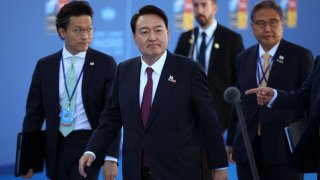South Korea’s Democracy Endured Yoon’s Authoritarian Nostalgia, but Trilateral Cooperation May Not
President Yoon Suk-yeol's sudden martial law declaration was a shock to everyone, foreigners and Koreans alike. However surprising this brief overthrow of South Korea's democratic process was, were there subtle signs that the environment was ripe in Korean politics to foster someone like Yoon?
Yoon Suk Yeol’s 2022 election came as a relief to the U.S. foreign policy community, given his support for the U.S. alliance, openness to improved ties with Japan, and a skeptical eye toward China’s influence over and intentions toward South Korea.
In all three regards, he looked to be an improvement over his predecessor, Moon Jae-in, who oversaw the worst deterioration in Japan-ROK ties in decades, perhaps since 1965 normalization, and whose efforts at bringing the U.S. and North Korea together for summitry flopped so hard that he lost credibility in the eyes of both Washington and Pyongyang.
Even in his campaign for the presidency, however, Yoon demonstrated some troubling tendencies, including ideological rigidity and a tendency toward loose-lipped declarations indicative of extremism, a lack of foresight, or both.
The best and worst tendencies he displayed on the campaign trail have come to fruition during his presidency.
The Ups and Downs
He has sought to bridge the divide with Tokyo, normalized U.S.-Japan-ROK trilateral discussions, and held firm in the face of both North Korean provocations and Chinese pressure. He has been steadfast in support of Ukraine in the aftermath of Russia’s unjustified invasion, despite this not being a universally popular stance.
His administration has also been plagued by scandal, he and his wife have been magnets for accusations of impropriety, and Yoon has wielded veto power, largely to protect himself, his family, and his administration from scrutiny. By the time Yoon unveiled a plan to bridge the inter-Korean divide, its pillars seemed calculated to repel Pyongyang, as though it had been drafted by and for anti-North activists and defense hawks, with no one else’s input.
But even by those standards, the December third and fourth martial law declaration demonstrates a shocking degree of insular thinking. Yoon’s declaration, with its references to “anti-state” activities and broad martial law command over the press and political institutions, hearkened back to declarations from Korea’s military rule period, as though Yoon expected the armed forces and anti-communist elements to rally behind him as quickly as they did Park Chung-hee in May 1961 or Chun Doo-hwan in December 1979.
In doing so he and the advisors behind the move profoundly misread the mood in the country. The moment the National Assembly voted to override his declaration it was clear the effort had failed, not because of the importance of the legislature, or even the rebuke that members of Yoon’s conservative party delivered by voting against him, but because the military personnel at the Assembly had failed to prevent the vote from happening.
Whether this was due to a lack of preparation or reservations about unleashing state violence against their countrymen for the sake of a president with an approval rating under 20 percent is immaterial.
This represents a miscalculation on a scale that’s difficult to overstate. The opposition is moving to draft impeachment articles now, and only a few conservative defections are necessary to facilitate impeachment, given the size of the opposition’s legislative majority. Yoon’s declaration betrayed a clear frustration with the opposition’s investigations and unwillingness to take up his legislative agenda.
Yet rather than suffer their impeachment efforts stoically while shoring up his party’s support and doing the mundane work of institutionalizing trilateral defense cooperation, Yoon seems to have given legislators all the evidence, and motive, necessary to vote him out now.
While the situation is fluid, motions are being drafted, and cabinet members offering their resignations, there are a few takeaways we can process now.
Overall Lessons
For one, the South Korean right cannot seem to distance itself from nostalgia for military rule. The residue of the 1961-87 period clung to the previous right-of-center administration, but Yoon seemed like a potential candidate for writing a new chapter for the movement, given his career as Moon Jae-in’s prosecutor-general, even overseeing former President Park Geun-hye’s prosecution.
However, his agenda was quickly subsumed under that of a broader movement that has sought to rehabilitate the legacies of the military period, and that of the anti-communist strongman Syngman Rhee before it. As noted, the declaration was a callback to previous authoritarian measures in both substance and style, as though Yoon had been egged on to emulate the “decisive action” of Park Chung-hee and Chun Doo-hwan, with no attention paid to how the country’s political culture has changed in the intervening decades.
In addition, efforts to deepen bilateral U.S.-ROK cooperation and trilateral ties with Japan have suffered a massive blow. The strengthening of such ties was all Yoon had to hang his hat on after two and a half years and they were pursued despite considerable opposition. Tokyo and Washington could have previously hoped that having Yoon in office through 2027 would further institutionalize efforts such as those spelled out at Camp David in August 2023, but Yoon may have just committed political suicide, a succeeding progressive administration may have entirely different priorities, and it’s not clear that the incoming Trump administration will place the same priority on mini-laterals.
The cause of defending a free and open Indo-Pacific remains a worthy one. If only it had better advocates.
Rob York is Director for Regional Affairs at Pacific Forum in Honolulu. He has a PhD in Korean history from the University of Hawaii.
Image Credit: Creative Commons and/or Shutterstock.

